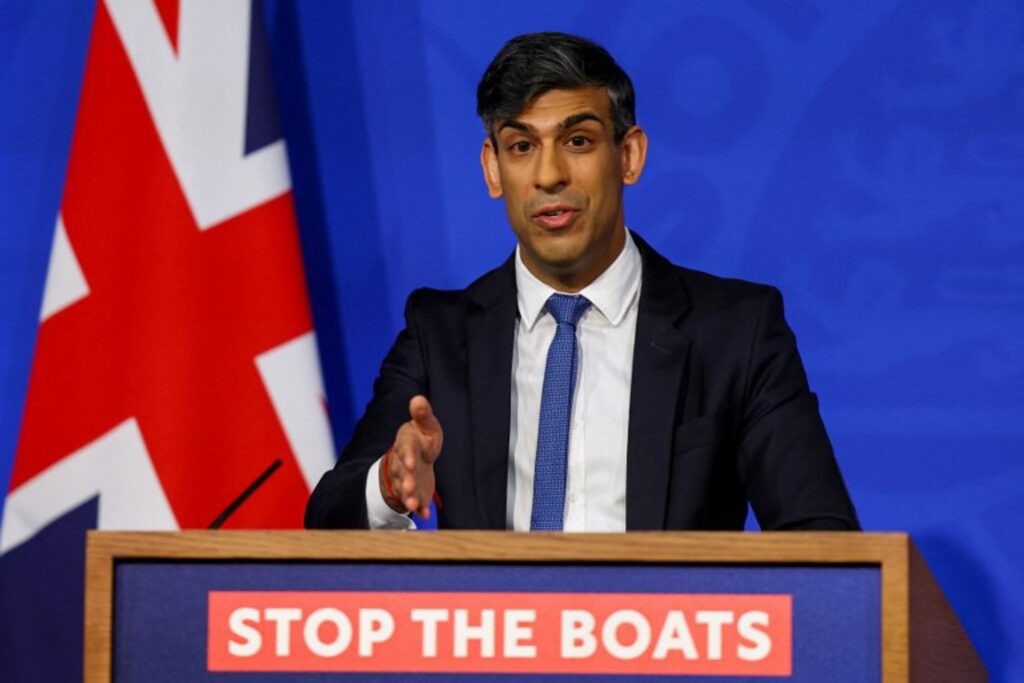After months of battle between the House of Commons and Lords, the UK Government finally approved the controversial bill allowing for the expulsion of undocumented asylum seekers to Rwanda on Monday evening.
The bill was first proposed by Prime Minister Rishi Sunak's Conservative government two years ago to prevent migrants from entering the country irregularly. It targets all undocumented asylum seekers who come into the United Kingdom, who often undertake dangerous journeys from their countries of origin and cross the English Channel in small boats.
The debated bill is tied to a new treaty between London and Kigali, in which substantial payments will be made to Rwanda for accepting the refugees. This move was in response to the Supreme Court ruling in November, which deemed the initial plan illegal.
While Rwanda is defined as a safe third country in the bill, it contradicts Rwanda's current political state. Despite being one of Africa's most stable nations, Rwandan President Paul Kagame has repeatedly been accused of ruling in fear, suppressing dissent and limiting freedom of expression.
Parliamentary ping-pong
The House of Lords, without a Conservative majority, delayed final adoption of the bill. It continuously referred it back to the House of Commons with amendments, which were subsequently rejected. This stalling tactic is known as "parliamentary ping-pong."
The House of Lords requested to hold off regarding Rwanda as a safe country until an independent body stated otherwise. They also sought to exempt UK agents, allies, and overseas-based employees, including Afghans who fought alongside British armed forces, from expulsion.
Eventually, the unelected upper house conceded to the lower house's democratic majority, ceasing further amendments and thus ensuring the law's enactment. It must now receive the Royal Seal – a mere formality – before coming into force.
On Monday, Sunak assured that his government was "ready" to deport asylum seekers to Rwanda in 10-12 weeks once the law was adopted. "These flights will take off, come what may," he said. Home secretary James Cleverly added that it was a "landmark moment in our plan to stop the boats."
Politics plays a role too, as the Prime Minister seeks to maintain power 18 months into office, while the Conservatives face a likely defeat in the upcoming general election.
Violation of human rights
The government's asylum bill has been heavily criticised by several bodies, including the Labour opposition, migrant help organisations, the head of the Anglican Church and the UN High Commissioner for Human Rights Volker Türk. He stated the bill goes "against the fundamental principles of human rights."
UN special rapporteurs for human trafficking, migrant rights and torture warned on Monday that airline companies and authorities facilitating the related flights "could be complicit in committing international human rights violations."
On Tuesday, the Council of Europe's newly-appointed Comissioner for Human Rights Michael O'Flaherty also called on the UK Government to reconsider its plan to deport migrants to Rwanda. Meanwhile, Denisa Delić, director of advocacy at International Rescue Committee UK, said: "Sending refugees to Rwanda is an ineffective, unnecessarily cruel and costly approach." The deal is expected cost £1.8 million for each of the first 300 deportees, the National Audit Office confirmed.
Delić said that the government should instead focus its approach on "scaling up safe routes, such as resettlement and family reunion, and upholding the right to seek asylum."
Lawyers will prepare legal challenges on behalf of individual asylum seekers and can challenge their removal on a case-by-case basis, according to The Guardian.
Related News
- Deporting migrants to Rwanda constitutes human rights violation, UN tells UK
- Asylum reception crisis: Academics denounce 'flagrant disregard' for rule of law
- Rwanda genocide: How the UN and EU failed to prevent it
Just hours after the bill was passed, five people including a child died in an attempt to cross the Channel early on Tuesday morning.
While Sunak said the "tragic" deaths showed why the Rwanda plan was needed, the Refugee Council in the UK described the deaths as "devastating" and "all the more tragic" coming just hours after the passing of the bill.
"The only sustainable way to reduce dangerous journeys […] is for the government to reduce the need for desperate people to take desperate actions. Instead of hostile, headline-grabbing legislation, we need to see safe routes for those fleeing conflict and persecution, including more options for family reunion, refugee visas, and cooperation with our European neighbours," Enver Solomon, the Council's Chief Executive, said.

